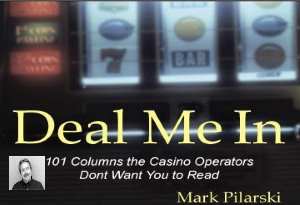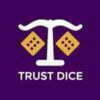I have cut and collected every column that you have written. We really enjoy them here in Biloxi, Mississippi. My one complaint is that in a few columns you use the phrase “certified friendly” when it comes to dealers. To be honest with you, I’ve run across some real boorish ones. What constitutes, in your opinion, “certified friendly”? Raymond G.
Raymond, it could be something as simple as management forcing dealers to wear ridiculous “stinkin badges” that pronounce that they are certified friendly. Dealers who are subject to such autocratic casino marketing plans will tell you that other, more savory adjectives could also be applied.
A specific example would be at Station Casinos in Las Vegas where they have a “10-5” rule for blackjack dealers. Dealers on dead tables are expected to show their pearly whites to any prospective player who comes within 10 feet of their game. Any player who comes within 5 feet of their tables is to be verbally greeted.
Will any of this make a crabby dealer more like Snuggles, the Fabric Softener Bear? Hardly. Casino management can try to legislate geniality, but being a friendly dealer, of which there are many, comes from within. You can’t decree friendliness.
I visited Las Vegas for the first time in August and had the time of my life learning to play craps at the Imperial Palace. They had 50¢ minimum bets and 100X odds. With the fact that I was winning, and they kept bringing me drinks, it was a fun and an inexpensive learning experience. My question is, does the 100X odds benefit the player by reducing the house advantage any more than a single or double odds game? Chris S.
Yes, Chris, considerably. BUT, if your bankroll is undercapitalized, after a few bad rolls your typical weekend gambler will be wiped out. Even on a 50¢ game.
A crap game that offers 100X odds is for players who typically wager between $25-$50 per hand, not a 50¢ inexperienced player. It takes nerve, and capital, to put $50.50 on the line and wait for a 4 to roll.
My brother-in-law thinks he can make a living counting cards while playing blackjack. He’s been playing on low limit tables because he doesn’t have any money. I have a two-part question. First, can he really beat the casino with his small bankroll, and second, if he can actually beat the casino counting cards, why does the casino offer a game they can’t make any money at? Robert A.
Because casinos make their money from the uninformed masses (over 95 percent), and what the heck, throw in bad card counters as well.
Card counters in general have an inherent advantage of between .5 and 1.5 percent against the house. But in your brother-in-law’s case, even if his debatable skills rival the pros, because his bankroll is limited (e.g., $1000 or less), his slight edge will produce nothing more than a $5-an-hour job for him.
Is it worth the constant hassle from pit bosses, exposure of his bankroll and the possibility of financial ruin for $5 an hour? I’ll pass and let him decide.
I recently came across a game in a casino that looked very similar to the game of War that we used to play as kids. Both players received one card and the high card won. What’s the catch? Ronald B.
Yes, Ronald, called War, this is a variation of the same senseless game you played as a youngster on the kitchen table. Both you and the dealer each receive one card, and the high card wins. In the event that both cards are equal, you must double your initial bet, and two more cards are dealt. Again the high card wins; however, you win only your original wager. This is how the casino pickpockets your billfold. The casino advantage from this one rule change: 7.14%.
Thumbs down for War.




















